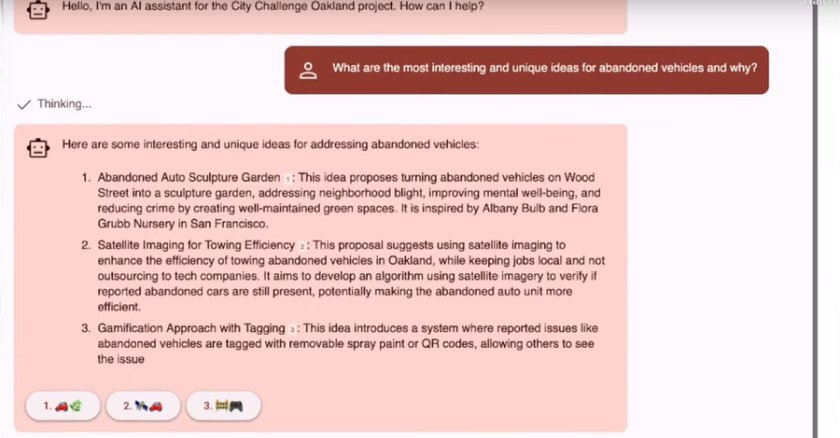In Brief:
Artificial intelligence — particularly generative AI — has come into focus as the leading edge of information technology evolution. The response has ranged from hyperbolic optimism to the expression of deep concerns about privacy and human agency.
There are legitimate positions to argue all along that continuum. With each shock of the new, humans say they don’t want computers to take over, but cellphones, social media and streaming entertainment are now widely embraced and taken for granted.
McGuinness has worked extensively with local leaders, serving as executive director of the Center for American Progress Action Fund and a senior fellow at the New America Foundation. In the Obama administration, she oversaw organizing and communications for the launch of HealthCare.gov and directed the Task Force on Community Solutions.
In 2020, she founded New Practice Lab, a nonprofit working to improve the ways social policy is designed and delivered. With Hana Schank, she is the author of Power to the Public: The Promise of Public Interest Technology.
First published in 2021, the book has recently been re-released. “It is my life's work to talk about how we make the government work,” McGuinness says. She shared her thoughts about government and technology in a recent conversation with Governing.
Governing: You say there's no solving the world's problems without government. Is that a message that needs reinforcing?
Tara McGuinness: The last couple of years have demonstrated that while there are many things private entities can do in the worlds of innovation, science and progress, seeing government as a critical partner in solving our public problems is essential.
That’s step one, before you get to how you do things.
Governing: Your book is about the uses of technology, but you also say technology is not the solution. What do you mean by that?
Tara McGuinness: Rarely, when you look deeply, will a single technology product be the solution.
It’s often about systemic challenges, management challenges. Technology can be an enabler, but there is no example in the research I did around the globe where an app will fix economic inequity or homelessness.
Governing: How should government approach technology projects?
Tara McGuinness: I have three pieces of advice for leaders in government.
The first is really simple. How can you walk in the shoes of the folks you serve? It is a technology practice to be ruthless about listening to the users of an Apple product, for example. That is No. 1: really big listening in real time to the folks you serve.
No. 2 is using basic data instrumentation to understand who's using a service or product and who's missing. You could do basic Google analytics. I am frequently surprising leaders of an agency with publicly available data about who does and doesn’t use their websites.
The third is to try things small and to iterate over time and improve. You need to do all three to be a modern manager.
Using data to change what doesn't work, and keep doing what does, is massively essential. When I worked on healthcare.gov, the first thing we didn't know was what about the site was broken.

(Princeton University Press)
It was a basic data instrumentation that allowed us to know where people were stuck at the login, where people were stuck shopping [for health-care plans]. Until we knew that, we couldn't really start to understand what needed to be fixed.
Governing: Are there other steps that tend to be omitted or not done thoroughly enough?
Tara McGuinness: Any public policy is only as good as our ability to implement. If you've named a new initiative, passed a law or have a plan, what is the ultimate goal and how will you measure success?
If you have allocated money, ask “what next” until you get to the person who receives the service. People think through the first step — rulemaking or making a funding announcement — but what is the next step, and how will we know we really reach people? What is the way we test?
There’s often a kind of “press and pray” situation where a policy is put out there, but the only feedback loop between citizens and their government is a kind of compliance process. Often, that isn't representative of all the voices in the room.
Governing: Are there applications that have an especially big ROI for state and local governments?
Tara McGuinness: This falls into the category of understanding what problem you're solving for. Some of the best examples are incredibly simple. They could be Google Sheets.
Community Solutions [a nonprofit addressing homelessness] is working in dozens of communities and has brought homelessness to zero. It wasn't a matter of a sophisticated technology apparatus; it was bringing all of the entities in a community who had different components of data to the same table to share what they knew about the problem of homelessness.
You can learn a ton by spending a day in the front lobby of your existing permitting department, or DMV, listening to what people's experiences are.
Governing: Do state and local governments need more people with digital skills to get the most out of technology projects — not just designers, but those who use and maintain systems?
Tara McGuinness: Yes. We have made a practice of outsourcing the delivery of much of what the government does. By losing the ability to have a certain level of expertise inside the government on management of technology and data, our ability to oversee, measure and do quality control is declining.
There's a big trend of increased use of data science at the city level for improving public services. I don't think we've yet seen that level of delivery at the state level, although it's improving.
If we want to have robust state and federal government, we need people who graduate as engineers or data scientists to see serving their community in a government capacity as an incredible way to use their skills. We have a long way to go there.
Government is going to have to be more competitive in its pay. Investing in human capital is immensely important.
Governing: What about AI?

(New Practice Lab)
Tara McGuinness: There's immense capacity to analyze data, especially if what is in the data sets is public and transparent. It is only as good as it can be checked by systems.
In the book we talk about a form of predictive analytics that was deployed by the government of Michigan to assess fraud in the unemployment insurance department. What went into the predictive analytics was very opaque, and it was inaccurate. It kept millions of Michiganders off of unemployment insurance at a period that was critical for them and took a long time to repair.
A big part of this will be creating a space for all of us to learn, and constantly educate ourselves about, what these tools do and what they don't do.
Technology will be as good or as bad as we are. Its ability to serve and improve is immense, as we've seen.
Governing: You left government and created a nonprofit. What will that enable you to do that you couldn’t do before?
Tara McGuinness: I founded something called the New Practice Lab.
There are amazing think tanks out there that work on policy, and there's an emerging field of companies and teams that work on the service delivery side. We have one foot in each of those worlds. We work intensively with governments, and we gift our work — we’re very focused on low-income families with kids under the age of six.
We need to do three things differently when we design new policy. We need to spend as much time as we can with the people who really use it and make sure we understand what their lives look like. We need to test early and often, and we need to find flaws and make improvements as quickly and openly as possible.
That sounds so basic, but for the most part it is not how we do policy at any level of government. I left the White House obsessed with how implementation is policy.
I don't think we're going to have people believe and trust in government more if it doesn't work, and we're not going to get it to work without listening to people's lived experiences.
Related Articles













